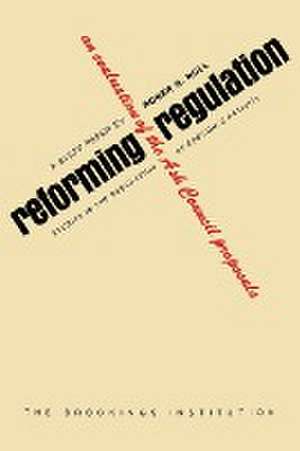Reforming Regulation: An Evaluation of the Ash Council Proposals
Autor Roger G. Nollen Limba Engleză Paperback – oct 1971
Many observers agree that federal regulation of business often fails to prevent monopoly profits, promote technological change, or protect consumers against market abuses. Why? President Nixon assigned the task of proposing reforms to his Advisory Council on Executive Organization, called the Ash Council after its chairman, Roy L. Ash. The object of both the Council's report and this paper is to advance the public search for reform.
The council suggested that a leading cause of regulatory failure lies in the organization of regulatory agencies. This analysis leads to an alternative view—that the regulatory process is inherently flawed regardless of agency organization, and the real sources of weakness may be laws establishing regulatory mandates and the political environment in which regulation operates. Drawing on the insights of economists, political scientists, and lawyers, the author examines a number of federal regulatory agencies and views their performance in the light of regulatory theory. He prescribes no remedies but suggests the route to be followed if regulation is to approach its economic and social goals.
The council suggested that a leading cause of regulatory failure lies in the organization of regulatory agencies. This analysis leads to an alternative view—that the regulatory process is inherently flawed regardless of agency organization, and the real sources of weakness may be laws establishing regulatory mandates and the political environment in which regulation operates. Drawing on the insights of economists, political scientists, and lawyers, the author examines a number of federal regulatory agencies and views their performance in the light of regulatory theory. He prescribes no remedies but suggests the route to be followed if regulation is to approach its economic and social goals.
Preț: 147.87 lei
Nou
Puncte Express: 222
Preț estimativ în valută:
28.29€ • 29.54$ • 23.36£
28.29€ • 29.54$ • 23.36£
Carte tipărită la comandă
Livrare economică 15-29 aprilie
Preluare comenzi: 021 569.72.76
Specificații
ISBN-13: 9780815761075
ISBN-10: 0815761074
Pagini: 116
Dimensiuni: 152 x 229 x 13 mm
Greutate: 0.18 kg
Editura: Brookings Institution Press
Colecția Brookings Institution Press
Locul publicării:United States
ISBN-10: 0815761074
Pagini: 116
Dimensiuni: 152 x 229 x 13 mm
Greutate: 0.18 kg
Editura: Brookings Institution Press
Colecția Brookings Institution Press
Locul publicării:United States
Notă biografică
Roger G. Noll is professor of economics at Stanford University and a nonresident senior fellow at the Brookings Institution.
Descriere
Many observers agree that federal regulation of business often fails to prevent monopoly profits, promote technological change, or protect consumers against market abuses. Why? President Nixon assigned the task of proposing reforms to his Advisory Council on Executive Organization, called the Ash Council after its chairman, Roy L. Ash. The object of both the Council's report and this paper is to advance the public search for reform.
The council suggested that a leading cause of regulatory failure lies in the organization of regulatory agencies. This analysis leads to an alternative view—that the regulatory process is inherently flawed regardless of agency organization, and the real sources of weakness may be laws establishing regulatory mandates and the political environment in which regulation operates. Drawing on the insights of economists, political scientists, and lawyers, the author examines a number of federal regulatory agencies and views their performance in the light of regulatory theory. He prescribes no remedies but suggests the route to be followed if regulation is to approach its economic and social goals.
The council suggested that a leading cause of regulatory failure lies in the organization of regulatory agencies. This analysis leads to an alternative view—that the regulatory process is inherently flawed regardless of agency organization, and the real sources of weakness may be laws establishing regulatory mandates and the political environment in which regulation operates. Drawing on the insights of economists, political scientists, and lawyers, the author examines a number of federal regulatory agencies and views their performance in the light of regulatory theory. He prescribes no remedies but suggests the route to be followed if regulation is to approach its economic and social goals.
